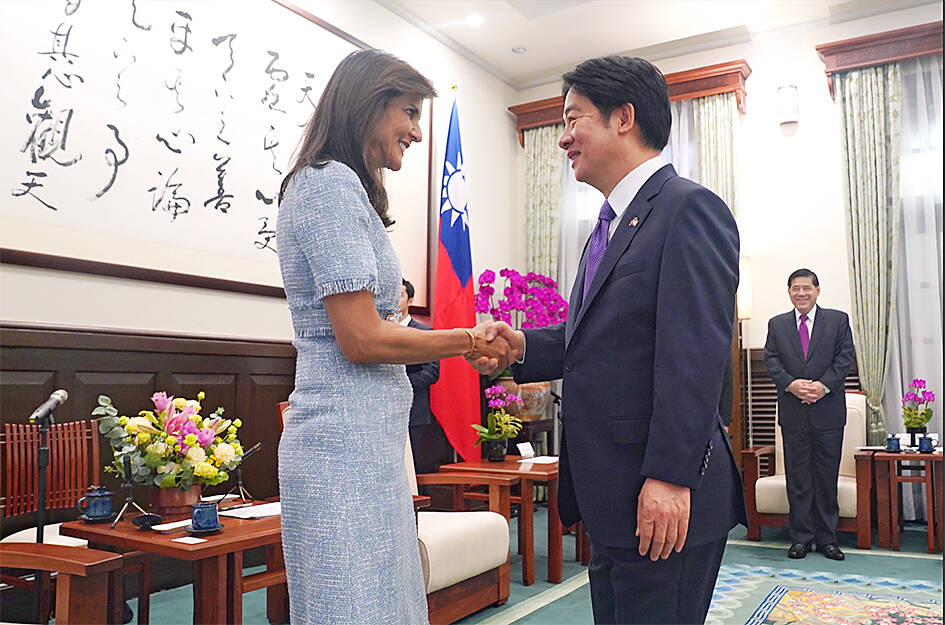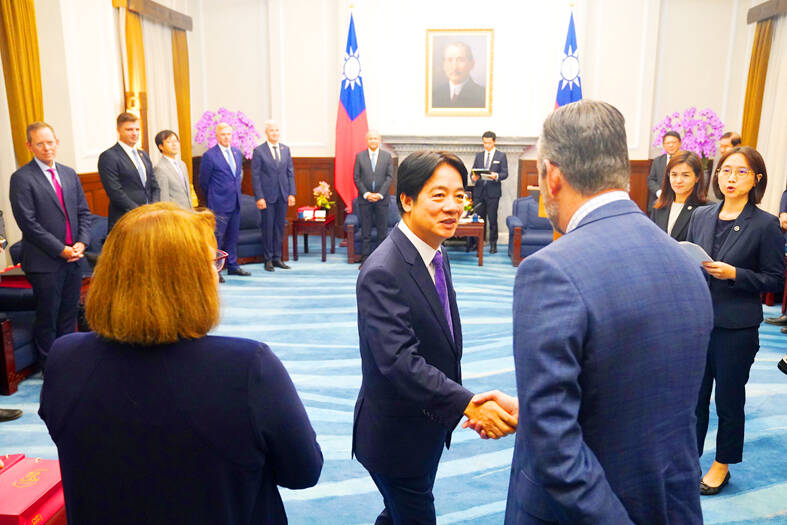President William Lai (賴清德) yesterday met with participants of the Ketagalan Forum, saying he hoped to cooperate with democratic partners to safeguard shared values and address challenges posed by authoritarianism.
The Ketagalan Forum was held on Wednesday in Taipei and was attended by politicians and experts from 11 nations.
It explored the cross-strait situation and global security order, as well as how “gray zone” tactics have impacted and challenged democracy, Lai said in his address to the guests at the Presidential Office in Taipei yesterday.

Photo: CNA
Lai thanked them for demonstrating the strength and determination to safeguard democracy by traveling from around the world to attend the forum.
Taiwan has been promoting the Taiwan-Europe Connectivity Initiative and New Southbound Policy to deepen economic and trade connections with partner countries, while also working with the US, Japan and Australia to expand the Global Cooperation and Training Framework (GCTF), he said.
“We are happy to announce Canada as GCTF’s full partner starting from this month and would enhance our cooperation on various global issues in the future,” Lai said.

Photo: CNA
Democratic partners must work together in solidarity to form industrial structures and supply chains that are resilient against the threats of authoritarian expansion, he said.
Center for Research on Strategic and Security Issues convener Pankaj Saran congratulated Lai on his election victory, saying that it attests to the will of Taiwanese in maintaining democracy.
Taiwan is a leader in global technology and production, and has been a deeply trusted supply chain partner, he said, praising Taiwan for transitioning from an “island of silicon” to an “island of artificial intelligence.”
Saran also said the New Southbound Policy has established cooperation with new partners and economies, and reduced the nation’s reliance on particular markets.
Separately, Lai met with a delegation led by former US ambassador to the UN Nikki Haley at the Presidential Office, who also attended the forum and gave a keynote speech on her first-ever visit to Taiwan.
Lai thanked Haley for appealing to the international community to embrace Taiwan against authoritarian threats posed by China.
“Ambassador Haley spoke up for Taiwan during her term as ambassador to the UN” and when Taiwanese are not allowed into the UN headquarters, she supported Taiwan by asserting that “the UN belongs to the world, and people of any country should have the right to enter the UN headquarters and work there,” he said.
In terms of economic issues, Lai said he is grateful that Haley had urged the US government to sign a free-trade agreement with Taiwan to prevent the nation from being isolated by China.
“And when I look at what we need with moral clarity, there’s nothing more stark than the differences between Taiwan and China,” she said.
While Taiwan is made up of “a courageous group of people that understand the importance of freedom and understand the importance of democracy,” China emphasizes “control and suppression,” she said.
The differences between Taiwan and China were particularly apparent during COVID-19, Haley said.
“That was in stark contrast to the lack of moral clarity by China, who hid the idea that the virus came from China, who didn’t tell the rest of the world the warnings that were happening, and who allowed millions of people to die because of their arrogance,” she said.
In contrast, despite being isolated from the world due to Chinese pressure, Taiwan tried to warn the WHO about the virus, Haley said.

Chinese Nationalist Party (KMT) Chairman Eric Chu (朱立倫), spokeswoman Yang Chih-yu (楊智伃) and Legislator Hsieh Lung-chieh (謝龍介) would be summoned by police for questioning for leading an illegal assembly on Thursday evening last week, Minister of the Interior Liu Shyh-fang (劉世芳) said today. The three KMT officials led an assembly outside the Taipei City Prosecutors’ Office, a restricted area where public assembly is not allowed, protesting the questioning of several KMT staff and searches of KMT headquarters and offices in a recall petition forgery case. Chu, Yang and Hsieh are all suspected of contravening the Assembly and Parade Act (集會遊行法) by holding

PRAISE: Japanese visitor Takashi Kubota said the Taiwanese temple architecture images showcased in the AI Art Gallery were the most impressive displays he saw Taiwan does not have an official pavilion at the World Expo in Osaka, Japan, because of its diplomatic predicament, but the government-backed Tech World pavilion is drawing interest with its unique recreations of works by Taiwanese artists. The pavilion features an artificial intelligence (AI)-based art gallery showcasing works of famous Taiwanese artists from the Japanese colonial period using innovative technologies. Among its main simulated displays are Eastern gouache paintings by Chen Chin (陳進), Lin Yu-shan (林玉山) and Kuo Hsueh-hu (郭雪湖), who were the three young Taiwanese painters selected for the East Asian Painting exhibition in 1927. Gouache is a water-based

Taiwan would welcome the return of Honduras as a diplomatic ally if its next president decides to make such a move, Minister of Foreign Affairs Lin Chia-lung (林佳龍) said yesterday. “Of course, we would welcome Honduras if they want to restore diplomatic ties with Taiwan after their elections,” Lin said at a meeting of the legislature’s Foreign Affairs and National Defense Committee, when asked to comment on statements made by two of the three Honduran presidential candidates during the presidential campaign in the Central American country. Taiwan is paying close attention to the region as a whole in the wake of a

OFF-TARGET: More than 30,000 participants were expected to take part in the Games next month, but only 6,550 foreign and 19,400 Taiwanese athletes have registered Taipei city councilors yesterday blasted the organizers of next month’s World Masters Games over sudden timetable and venue changes, which they said have caused thousands of participants to back out of the international sporting event, among other organizational issues. They also cited visa delays and political interference by China as reasons many foreign athletes are requesting refunds for the event, to be held from May 17 to 30. Jointly organized by the Taipei and New Taipei City governments, the games have been rocked by numerous controversies since preparations began in 2020. Taipei City Councilor Lin Yen-feng (林延鳳) said yesterday that new measures by